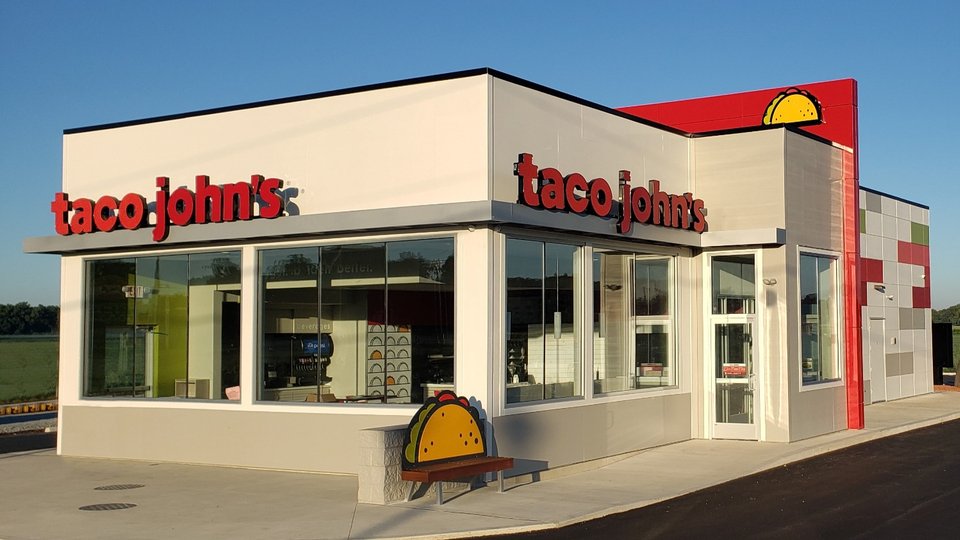Operations
Beyond the burrito: How Taco John's 'People First' approach drives success
Taco John's emphasizes a "Putting People First" philosophy to combat employee turnover by investing in its corporate leadership, supporting franchisees and prioritizing employee well-being and development.

May 9, 2025 by Mandy Wolf Detwiler — Editor, Networld Media Group
Taco John's started as a trailer in 1968 run by John Turner. The brand, headquartered in Cheyenne, Wyoming, began franchising a year later and changed its name from Taco House to Taco John's in honor of Turner.
Today, the brand has 400 locations and 8,000 employees. Employee retention remains a critical concern in 2025 with a Work Institute report showing that one in three employees plan to leave their role within the first year with a lack of career advancement opportunities.
 |
Heather Neary, president and CEO of Taco John's. Photo: Taco John's |
Heather Neary, president and CEO of Taco John's, brings more than two decades of experience in the restaurant, branding and restaurant spaces in key leadership roles, including brand president at KBP Brands and Auntie Anne's. She understands the importance of culture, and how starting from the top and leading by example is crucial.
QSRweb talked to Neary in a Q&A about putting its people first and being a boots-on-the-ground boss.
Q: Taco John's emphasizes "Putting People First." Can you share specific initiatives or programs you've implemented that demonstrate this commitment to employees at all levels, from corporate to individual restaurant team members?
Neary: At Taco John's we take a multi-pronged approach to putting people first, ensuring that it is embedded in every level of our organization, from corporate leadership to restaurant team members. We also believe strongly in the trickle-down culture that we've created by first investing in our corporate leadership team. In bolstering our executive bench with leaders who know the foodservice industry and prioritizing employee development, our corporate team is well-equipped to set franchisees up for success.
We've worked on refining our franchisee recruitment process to help ensure long-term success for all the operators in our system. Members of the Association of Taco John's Franchisees have a seat at the table in communication and collaboration with Taco John's International, enabling us to make informed decisions that reflect our franchisee experiences. Franchisees play a crucial role in how our brand is positioned, and they set the tone for restaurant team members.
We encourage our franchisees to be in their stores as often as possible, so they can see firsthand how new implementations are working, and what operations need to be adjusted so team members can be successful and the restaurants can operate smoothly. We offer continuous franchisee support, with concierge support from day one, and for restaurant team members, franchisees offer a career with work-life balance and training opportunities to advance their career. We put our franchisees first so they can put their team members first, and, in turn, their team members can then put customers first. The restaurant industry is all about people.
Q: How does prioritizing employees' well-being and development contribute to the overall success and culture of Taco John's, and what metrics do you use to gauge the impact of these efforts?
Neary: When team members are well supported, there is an increase in productivity and motivation, and a decrease in turnover. We have always made sure that this is more than "just a job" by prioritizing employee well-being and development, as well as creating a positive company culture.
Our approach combines professional development programs, health-focused initiatives, and company engagement. Our goal is to create lasting careers for team members through opportunities to advance within the company, and we support our employees' overall health and wellness through health plans and wellness participation.
We use our employee engagement surveys to measure the impact of our efforts and collect feedback from all levels at the company. Our GM Roundtable program also gives restaurant general managers a platform to connect and voice what is working for them and what isn't, sharing feedback and discussing challenges. Many franchisees in our system have worked as team members at Taco John's locations, reiterating that we've been able to attract and retain dedicated and passionate people.
Q: What strategies does Taco John's employ to ensure that the "People First" philosophy is consistently felt and practiced by managers and leaders at every level of the organization?
Neary:We know that the food service business is all about people, and building trust and strengthening relationships is key for success. Intentional strategy and leadership accountability is reiterated through training, performance metrics and feedback loops. We rely heavily on transparency and communication, and fostering a culture where everyone knows they are seen and heard is critical in maintaining our "People First" philosophy.
Our core values are reinforced in everything we do. When implementing new initiatives, whether operational, technological, or strategic, we seek feedback at all levels to guide our decisions. Our leadership teams understand that there are going to be learning curves, and our GM Roundtables, Association of Taco John's Franchisees and employee feedback allow us to make any necessary adjustments so that we are implementing what is best for our people. Rather than looking solely at restaurant performance, we take a close look at employee engagement and retention to ensure that what we say is what we do.
Q: You believe in leading by example. Can you describe a recent instance where your direct involvement or actions significantly influenced the culture or a specific situation within Taco John's?
Neary: Leading by example is in everything I do, and I pride myself on integrity and doing what I say. In my role, my goal is to honor the value that every single person brings to the company and listen to their feedback. There is no job that is beneath you, and when I started my role here, I traveled to Taco John's locations across the country to spend time in the restaurants and behind the counter. This experience gave me a deep insight into how our restaurants operate and helped to fuel the culture that we all work together, regardless of role, as one team. I will continue to visit restaurants, host roundtables, and participate in one-on-ones with all of our team members so I can better learn and understand what's happening in our restaurants and what ideas are coming from the people making the magic happen every day. I can't pretend to know all the answers — sometimes, the best answers and ideas come from the crew who are living it every day!
Q: How do you balance your responsibilities as CEO with the desire to be a "boots on the ground boss," and what are some of the key insights you gain from directly engaging with restaurant teams and operations?
Neary: I view being "boots on the ground" as one of my responsibilities as CEO. Being in restaurants and engaging with teams has directly impacted some of the decisions I've made. It can be easy for leadership to get caught in the trap of ivory tower syndrome. When this happens, decisions are made without seeing firsthand how those decisions trickle down to affect every single Taco John's location. By being boots on the ground, visiting stores, listening and seeing what their needs are, I've been able to establish key areas to focus on: enhanced operations, improving unit level economics and attracting a younger demographic of consumers.
Q: How does Taco John's ensure that clear standards and expectations are communicated effectively to all team members across the organization?
Neary: We rely on our core values to help ensure that clear standards and expectations are communicated effectively. These values and our goals have helped us to create a roadmap focusing on operations, development, branding, and technology, that provides unified direction for everyone in our system. Continuous training and education also play a large role as we've set expectations, ensuring that everyone is well equipped to handle them with a clear roadmap to success.
Checkpoints are put in place for franchisees to ensure that they are meeting standards, and in team member training they are made aware of what needs to be done to meet and exceed these standards. In the spirit of continuous improvement, we also are in the middle of revamping our training to be more relevant to today's learners – after hearing direct feedback from our team members.
Q: In a "trickle-down" culture, how do you empower managers at different levels to hold their teams accountable while maintaining a supportive and growth-oriented environment?
Neary: This also goes back to setting clear expectations and reiterating the importance of our core values. Our team managers are given the support, tools and resources that they need to set themselves and their teams up for success. Leading by example is a large part of our company culture, and that truly does trickle down to each level of management and the entire team at Taco John's. We also ensure that each manager is valued and their feedback is acted on so that they can truly lead by example and model the way for their teams.
Q: What processes or mechanisms does Taco John's have in place to address situations where standards are not being met, and how does this contribute to the overall culture of accountability?
Neary: Accountability is huge here at Taco John's, and we have very detailed standard operating procedures to ensure that each restaurant is operating within those standards. In-store visits allow us to assess each restaurant, and when standards are not being met, we work with the franchisee to get them back on track. When franchisees are getting off the ground, we have a "triage" phase where all eyes are on that store and its performance, and if any store dips below our key performance indicators they are placed back onto "triage" to ensure they meet their benchmarks.
Franchisees are also given checkpoints for standards that need to be adhered to, so they know where they stand in terms of performance in the system.
Finally, we rate each restaurant and each franchisee on a monthly scorecard, which is a compilation of key metrics. We publish this each month to congratulate those at the top and to hold everyone accountable. Transparency is a key part of our winning formula.
Q: What advice would you give to other leaders who want to foster a culture where leadership is visible, engaged and leads by example?
Neary: As a leader, you are setting the tone for the entire brand. Listening is key — hear what every team member has to say and genuinely take that into consideration when making decisions. Take the time to get to know the people around you and learn what drives them and what they need to be successful. Be decisive — make a decision. Too often, leaders hesitate to make a decision. That indecision leads to a lack of trust in your team. Not every decision will be perfect. Make a decision, evaluate and pivot if necessary. It doesn't need to be overly complicated — just support the people around you and do what you say and say what you do.
About Mandy Wolf Detwiler
Mandy Wolf Detwiler is the managing editor at Networld Media Group and the site editor for PizzaMarketplace.com and QSRweb.com. She has more than 20 years’ experience covering food, people and places.
An award-winning print journalist, Mandy brings more than 20 years’ experience to Networld Media Group. She has spent nearly two decades covering the pizza industry, from independent pizzerias to multi-unit chains and every size business in between. Mandy has been featured on the Food Network and has won numerous awards for her coverage of the restaurant industry. She has an insatiable appetite for learning, and can tell you where to find the best slices in the country after spending 15 years traveling and eating pizza for a living.
 ChatGPT
ChatGPT Grok
Grok Perplexity
Perplexity Claude
Claude








